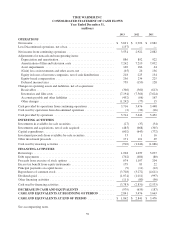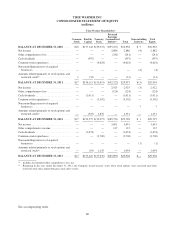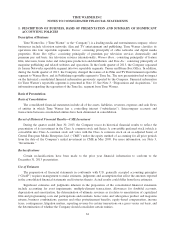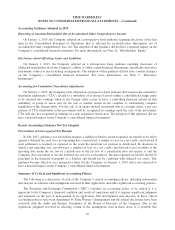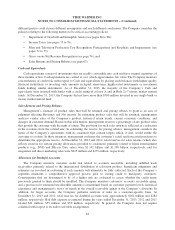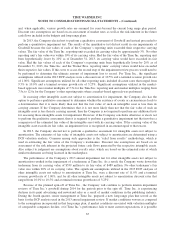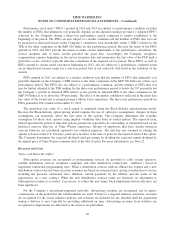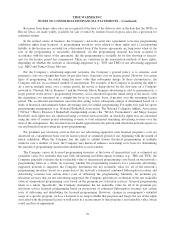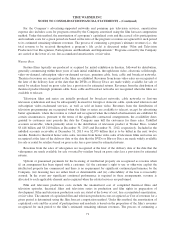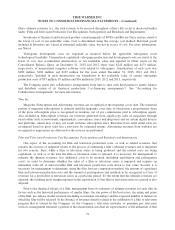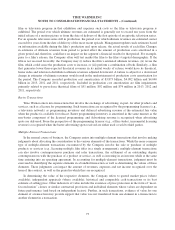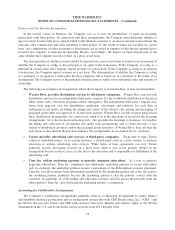Time Magazine 2013 Annual Report Download - page 80
Download and view the complete annual report
Please find page 80 of the 2013 Time Magazine annual report below. You can navigate through the pages in the report by either clicking on the pages listed below, or by using the keyword search tool below to find specific information within the annual report.TIME WARNER INC.
NOTES TO CONSOLIDATED FINANCIAL STATEMENTS – (Continued)
Investments
Investments in companies in which Time Warner has significant influence, but less than a controlling voting
interest, are accounted for using the equity method. Significant influence is generally presumed to exist when
Time Warner owns between 20% and 50% of the voting interests in the investee, holds substantial management
rights or holds an interest of less than 20% in an investee that is a limited liability partnership or limited liability
corporation that is treated as a flow-through entity.
Under the equity method of accounting, only Time Warner’s investment in and amounts due to and from the
equity investee are included in the Consolidated Balance Sheet; only Time Warner’s share of the investee’s
earnings (losses) is included in the Consolidated Statement of Operations; and only the dividends, cash
distributions, loans or other cash received from the investee, additional cash investments, loan repayments or
other cash paid to the investee are included in the Consolidated Statement of Cash Flows. Additionally, the
carrying value of investments accounted for using the equity method of accounting is reduced to reflect any
other-than-temporary declines in value (see “Asset Impairments” below).
Investments in companies in which Time Warner does not have a controlling interest or over which it is
unable to exert significant influence are generally accounted for at market value if the investments are publicly
traded. If the investment or security is not publicly traded, the investment is accounted for at cost. Unrealized
gains and losses on investments accounted for at market value are reported, net of tax, in Accumulated other
comprehensive loss, net, until the investment is sold or considered impaired (see “Asset Impairments” below), at
which time the realized gain or loss is included in Other loss, net. Dividends and other distributions of earnings
from both market-value investments and investments accounted for at cost are included in Other loss, net, when
declared. For more information, see Notes 3 and 4.
Consolidation
Time Warner consolidates all variable interest entities (“VIEs”) in which the Company is deemed to be the
primary beneficiary and all other entities in which it has a controlling voting interest. An entity is generally a VIE
if it meets any of the following criteria: (i) the entity has insufficient equity to finance its activities without
additional subordinated financial support from other parties, (ii) the equity investors cannot make significant
decisions about the entity’s operations or (iii) the voting rights of some investors are not proportional to their
obligations to absorb the expected losses of the entity or receive the expected returns of the entity and
substantially all of the entity’s activities involve or are conducted on behalf of the investor with
disproportionately few voting rights. Time Warner periodically makes judgments in determining whether its
investees are VIEs and, each reporting period, the Company assesses whether it is the primary beneficiary of any
of its VIEs. Entities determined to be VIEs primarily consist of HBO Latin America Group (“HBO LAG”)
because the Company’s ownership and voting rights in this entity are disproportionate. HBO LAG operates
multi-channel premium pay and basic tier television services in Latin America and is accounted for using the
equity method. See Note 4 for additional information.
At December 31, 2012, HBO Asia and HBO South Asia were also considered VIEs of the Company. During
2013, the Company purchased the remaining interests in these entities and began consolidating their financial
results from the acquisition date. See Note 3 for additional information.
Foreign Currency Translation
Financial statements of subsidiaries operating outside the United States whose functional currency is not the
U.S. Dollar are translated at the rates of exchange on the balance sheet date for assets and liabilities and at
average rates of exchange for revenues and expenses during the period. Translation gains or losses on assets and
liabilities are included as a component of Accumulated other comprehensive loss, net.
64







